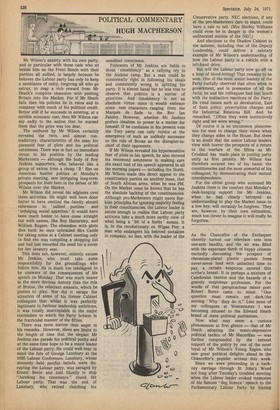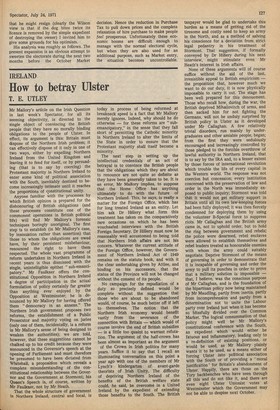POLITICAL COMMENTARY HUGH MACPHERSON
Mr Wilson's anxiety with his own party and in particular with those cads who sit beside him on the Front Bench with their purities all sullied, is largely because he believes the Labour party has only to keep a semblance of unity, forgiving all who go astray, to reap a rich reward from Mr Heath's complete obsession with pushing Britain into the Market. For if Mr Heath fails then his policies lie in ruins and in company with much of his political credit. Better still if he succeeds in entering, at a terrible economic cost, then Mr Wilson can say sadly to the nation that he warned them that the price was too dear.
The outburst by Mr Wilson certainly revealed the twin, and almost contradictory, characteristics of the man: his paranoid fear of plots and •his political astuteness. There was in fact no immediate threat to his position by the leading Marketeers — although the body of Roy Jenkins supporters, who behaved like a group of extras from a cheap ' B' film on American hustler politics at Monday's private meeting, saw intriguing long-term prospects for their hero in the defeat of Mr Wilson over the Market.
Mr Wilson did reveal his edginess over these activities. He might well have done better to have omitted the faintly absurd references to ' sullied purities ' and 'indulging social appetites.' It would have been much better to have come straight out with names, like Roy Hattersley, and William Rogers. The obsession with plots dies hard: he once upbraided Mrs Castle for taking notes at a Cabinet meeting only to find she was compiling a shopping list and had just recorded the need for a cover for her lavatory seat.
This does not, however, entirely excuse Mr Jenkins, who must take some responsibility for the groundlings who follow him. He is much too intelligent to be unaware of the consequences of his speech on Monday. That was much nearer to the more devious Antony than the role of Brutus, the reluctant assassin, which he prefers to play. Nor did it escape the attention of some of his former Cabinet colleagues that whilst it was perfectly legitimate ta harbour leadership ambitions, it was totally unacceptable to the major contenders to watch the Party behave in the fratricidal manner of the fifties.
There was more sorrow than anger in his remarks. However, there are limits to the length of time that the elegant Mr Jenkins can parade his political purity and at the same time hope to be a major leader of the Labour party. He could well bear in mind the fate of George Lansbury at the 1935 Labour Conference. Lansbury, whose sincerely held pacifist beliefs were disrupting the Labour party, was savaged by Ernest Bevin and told bluntly to stop "hawking his conscience" round the Labour party. That was the end of Lansbury, who retired clutching his Followers of Mr Jenkins are liable to shout ' consistency ' as a rallying cry to the Jenkins camp. But a man could be consistently right in following his ideals and consistently wrong in splitting his party. It is almost banal but no less true to observe that politics is a matter of priorities. And consistency is not an absolute virtue since it would embrace some rum characters ranging from the Marquis de Sade to the Rev Ian Paisley. However, whether Mr Jenkins prefers idealism to power is a matter for himself. If he continues in his present vein the Tory party can only rejoice at the emergence of such an unlikely successor to the role of Bevan as the disrupter-inchief of their opponents.
If Mr Wilson revealed his hypersensitive fear of plots in his speech, he also showed his renowned astuteness in making sure the exact text of his speech appeared in all the morning papers — including the North. Mr Wilson made this direct appeal to the constituency parties on another issue, that of South African arms, when he was PM. On the Market issue he knows that he has the absolute backing of the constituencies. Although pro-Marketeers might quote Burkian principles for ignoring majority feeling in their constituencies, the Labour leader is astute enough to realize that Labour party activists take a much more earthy view of what being a 'bit of a burke ' means. It is, to the revolutionary on Wigan Pier, a man who endangers his beloved socialism in company, no less, with the deader of the Conservative party. NEC elections, if any of the pro-Marketeers dare to stand, could have a tale to tell. (Mrs Shirley Williams could even be in danger in the women's unliberated section of the NEC.) And elections to the Shadow Cabinet in the autumn, including that of the Deputy Leadership, could deliver a salutary example of Mr Wilson's understanding of how the Labour party is a vehicle with a left-hand drive.
But will the Labour party now go off on a bout of blood-letting? That remains to be seen. One of the most senior leaders of the Party ruefully observed that often when in government, and in possession of all the facts, he and his colleagues had lost touch with the instinctive reactions of the Party. He cited issues such as devaluation, East of Suez policy, prescription charges and the Industrial Relations Bill. And he remarked, "Often they were instinctively right and we were wrong."
Of course it is no uncommon phenomenon for men to change their views when they change sides in the House. But there is no doubt that the senior Labour leaders view with horror the prospects of a return to the warfare of the fifties as Mr Crosland has made plain in putting party unity as first priority. Mr Wilson has therefore secured two of his bases: the constituencies and the most powerful of his colleagues, by demonstrating their mutual interdependence.
For the elitist group who surround Mr Jenkins there is the comfort that Monday's desk-banging support for Mr Jenkins, when he had clearly betrayed an understanding to play the Market issue in a low key, will certainly be forgiven. They are, however, by their own estimation, much too clever to imagine it will really be forgotten.
As the Chancellor of the Exchequer cheerily turned our televison sets into one-arm bandits, and the air was filled With the expectant throb of happy citizens excitedly discussing the prospect of chromium-plated plastic gnomes from never-never land with unlimited time to pay, a certain suspicion entered this scribe's breast. It is perhaps a mixture of Caledonian caution and the hazards of a gravely suspicious profession. For the words of that perspicacious minor poet Robert Burns came to mind: "One question must remain yet dark/the moving 'Why' they do it." Like most of my colleagues at Westminster I was becoming attuned to the Edward Heath brand of stern political puritanism.
Now what may seem a curious phenomenon at first glance — that of Mr Heath adopting the manic-depressive political tactics of Mr Macmillan — was further compounded by the earnest support of the policy by one of the most loyal of Mr Wilson's Young Eagles who saw great political delights ahead in the Chancellor's popular actions this week.
Since we were proceeding in a hackney carriage through St John's Wood not 'long after Tuesday's troubled meeting when the Labour leader evoked memories of his famous dog licence' speech to the Parliamentary Labour Party by hinting that he might resign (clearly the Wilson view is that if the dog bites twice its licence is removed by the simple expedient of destroying the owner) I invited him to give some grounds for his optimism.
His analysis was roughly as follows. The present expansion is an obvious attempt to sweeten the electorate during the next two months before the October Market decision. Hence the reduction in Purchase Tax to pull down prices and the complete relaxation of hire purchase to make people feel prosperous. Unfortunately these economic booms are difficult enough to manage with the normal electoral cycle, but when they are also used for an additional purpose, such as Market entry, the situation becomes uncontrollable.











































 Previous page
Previous page